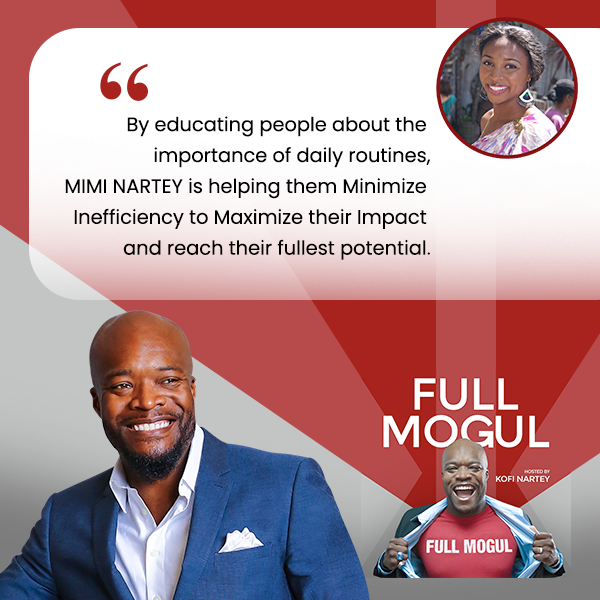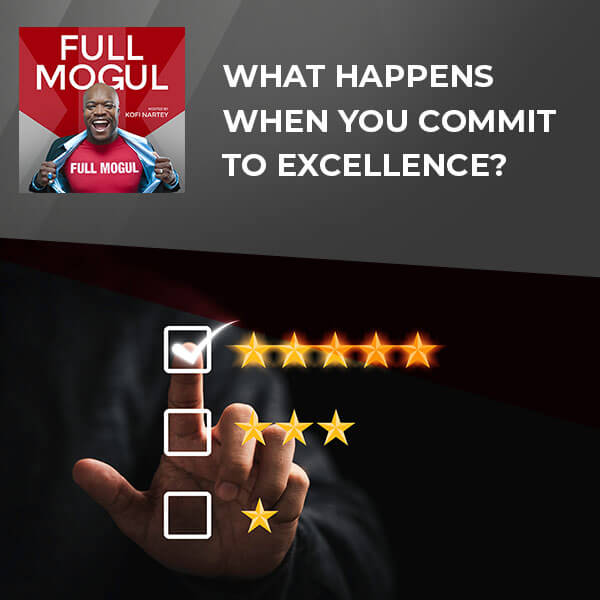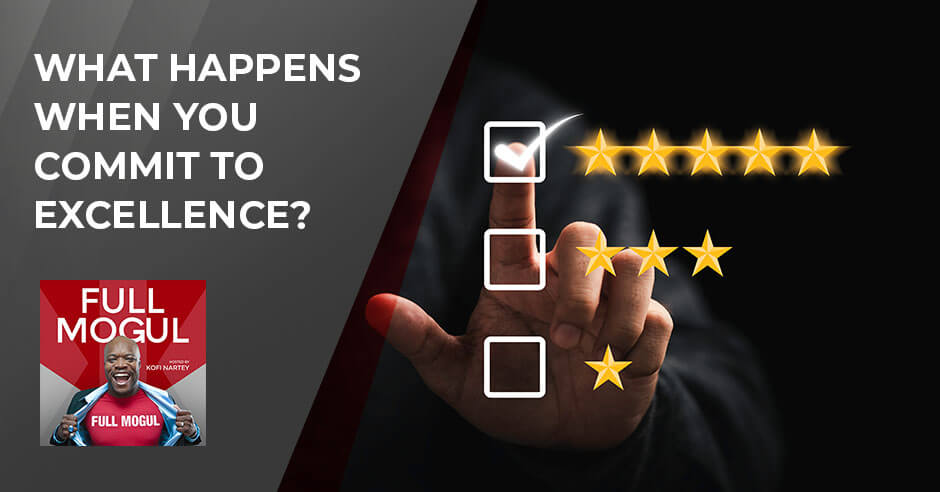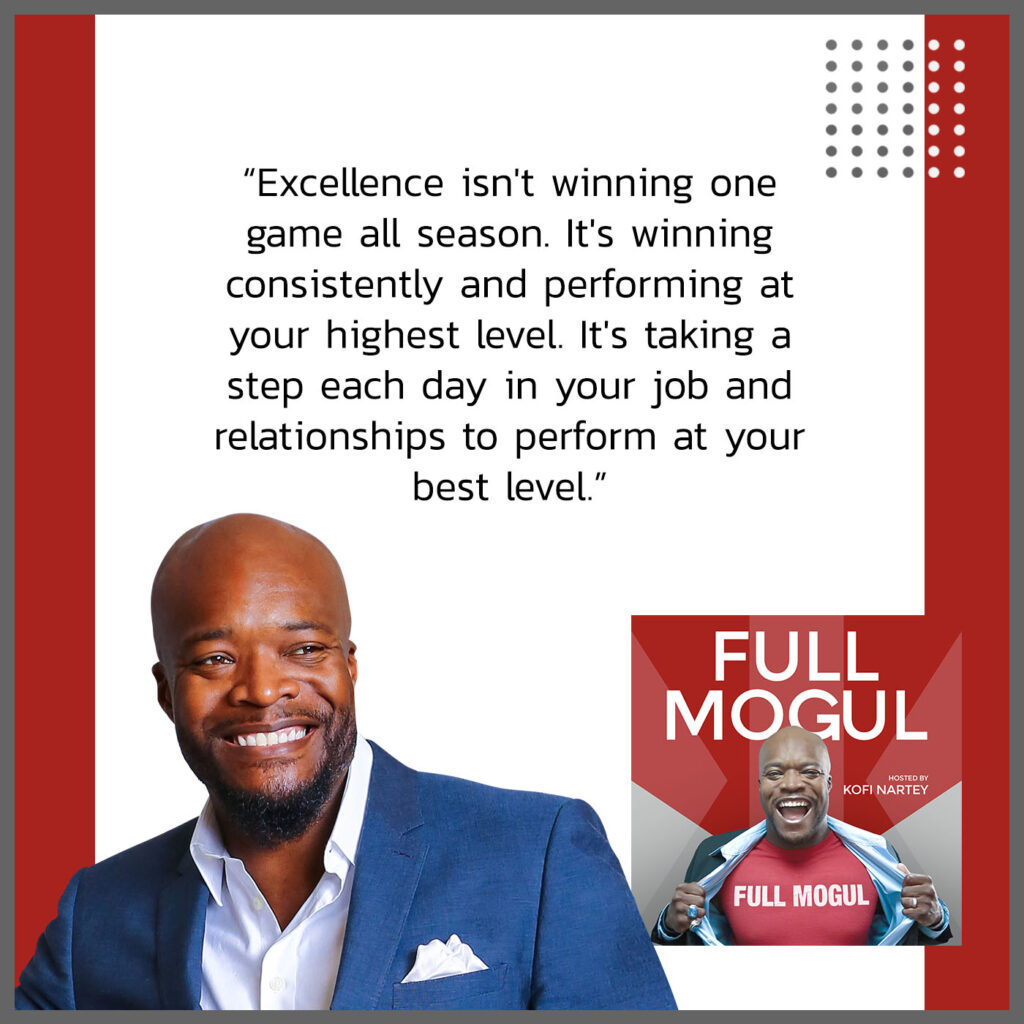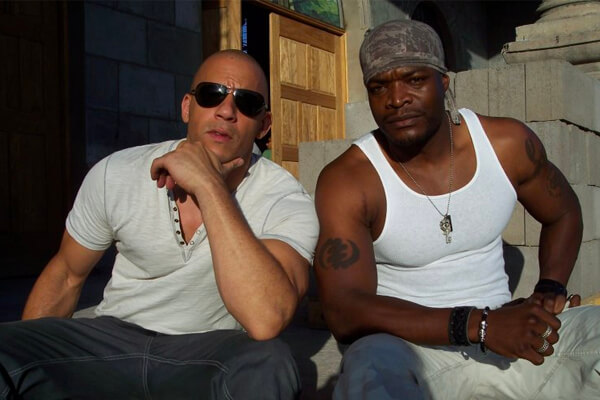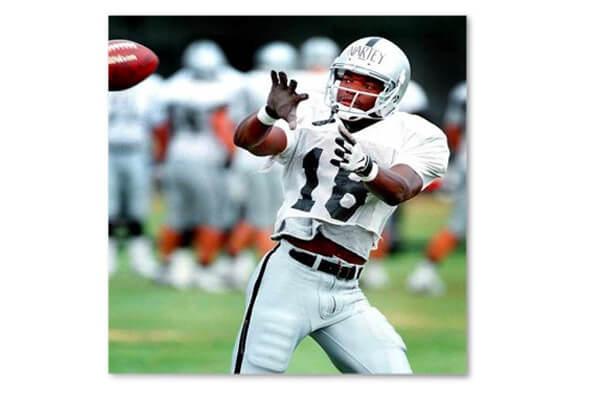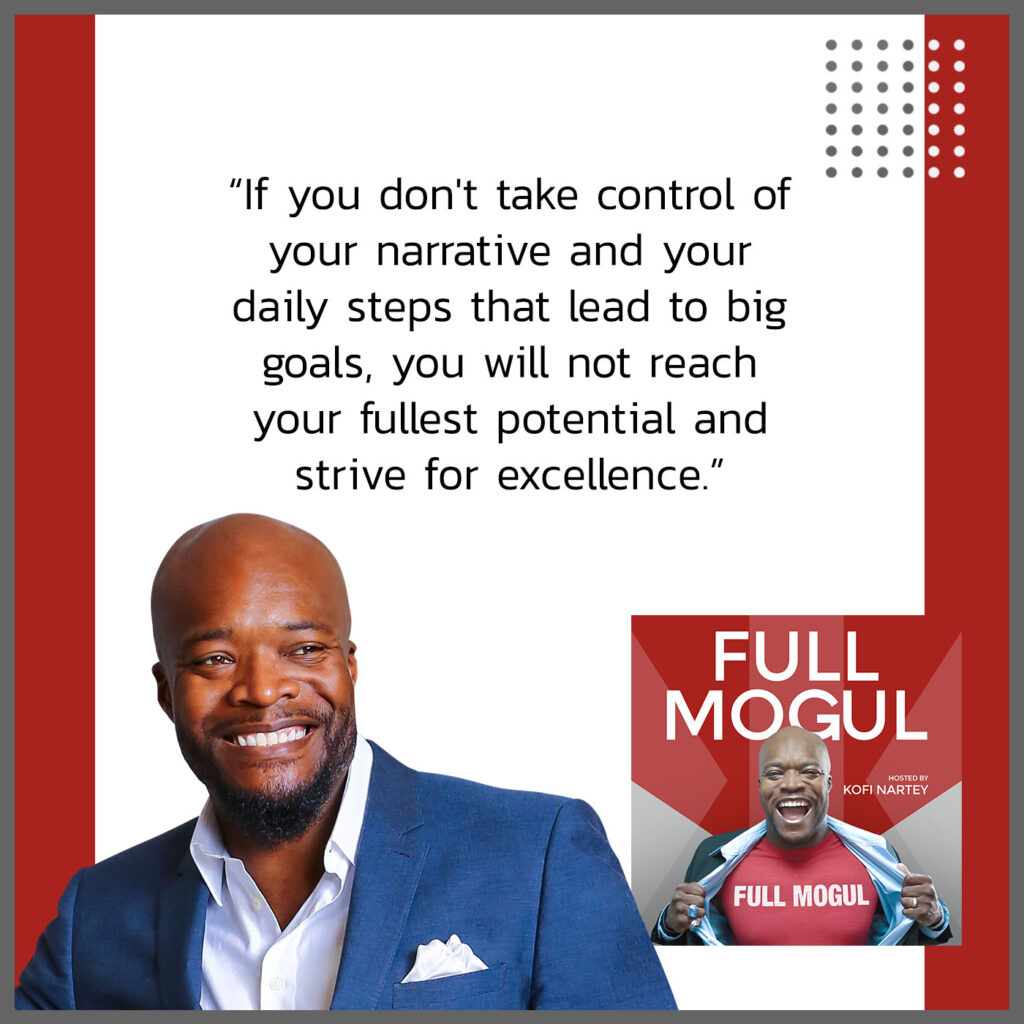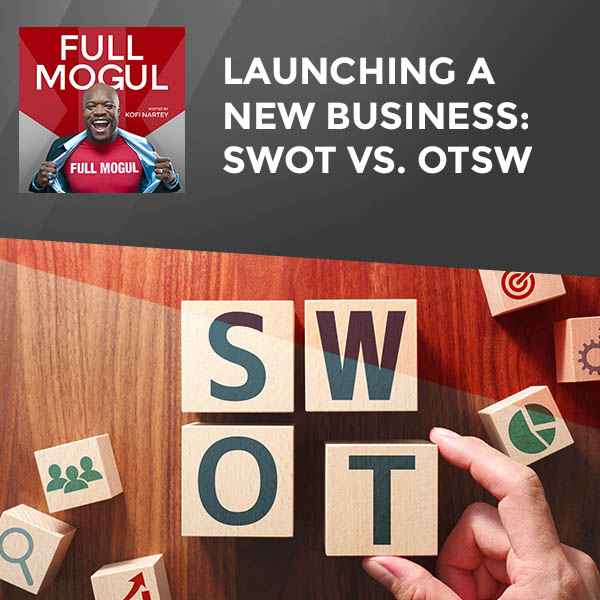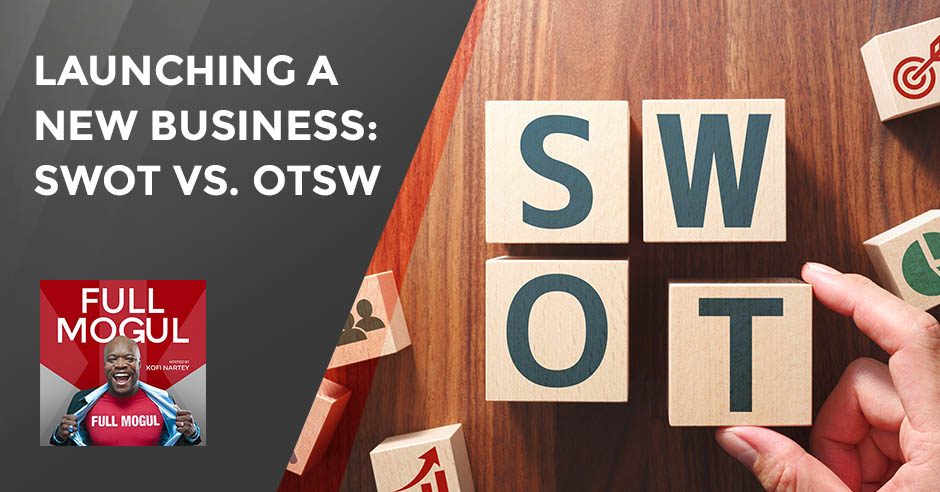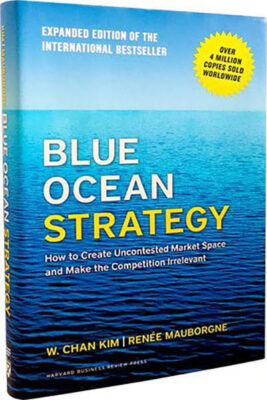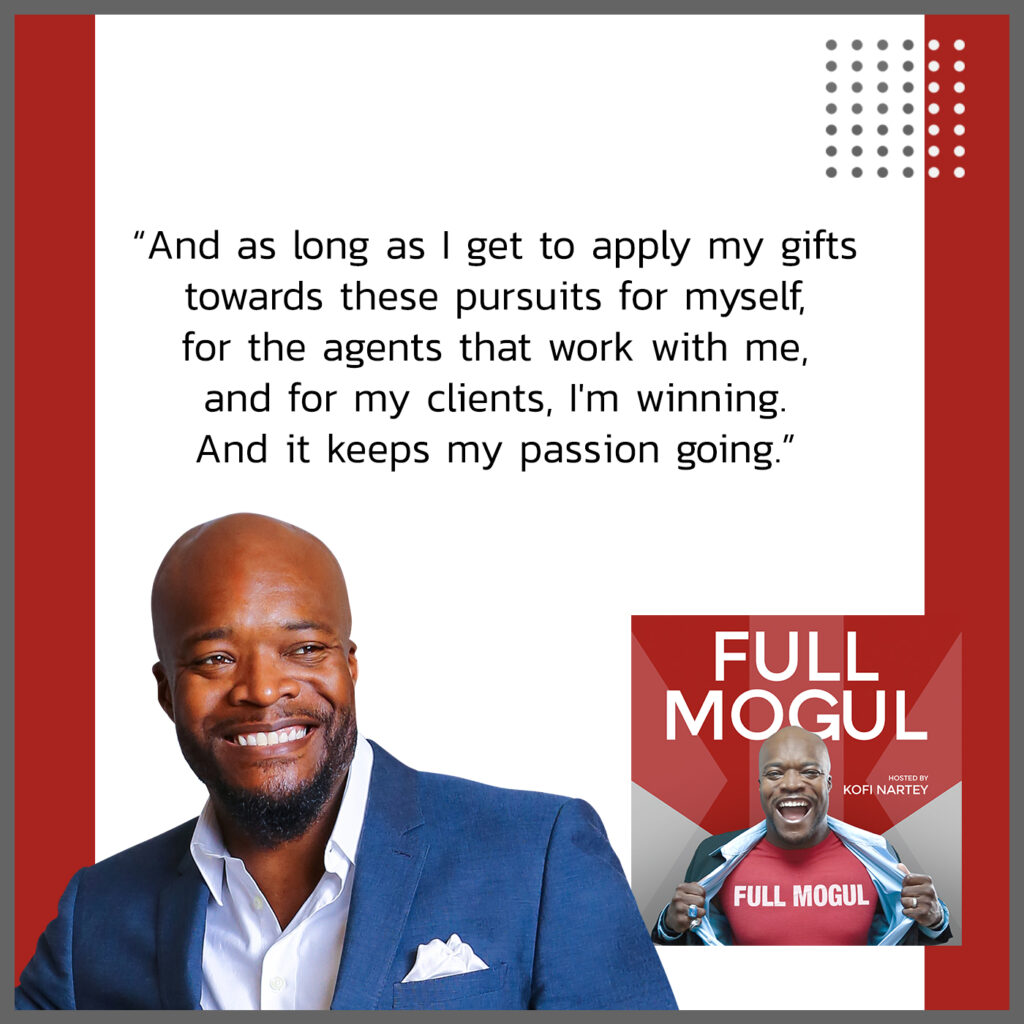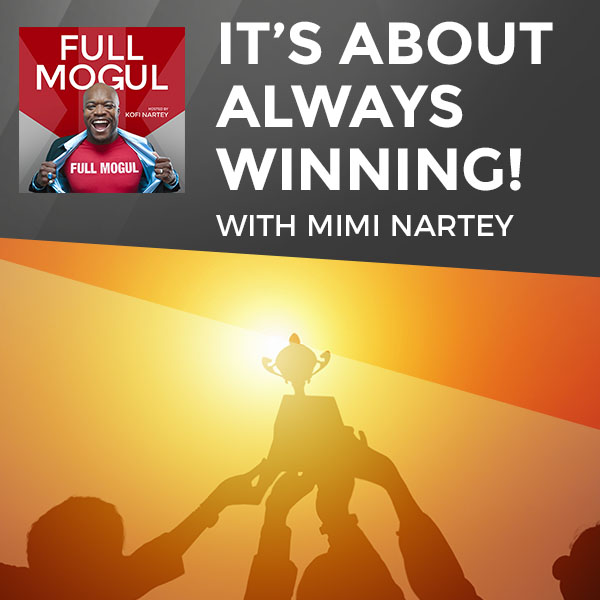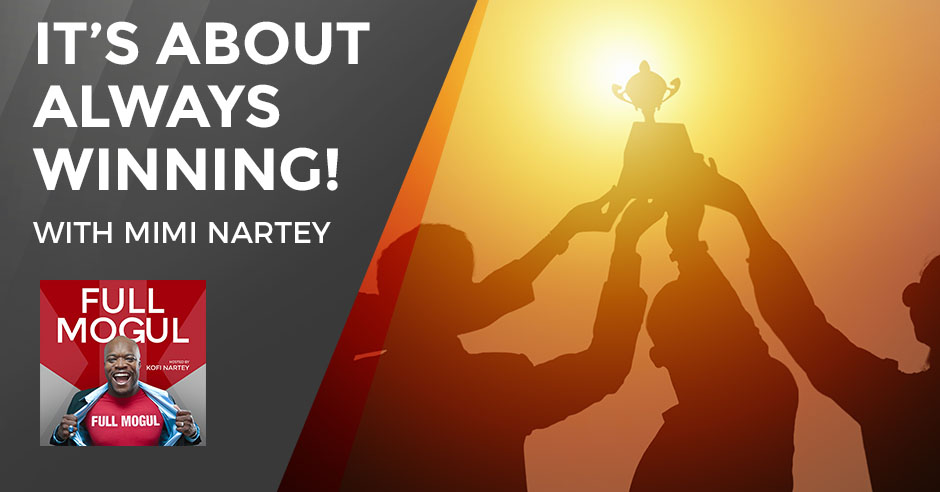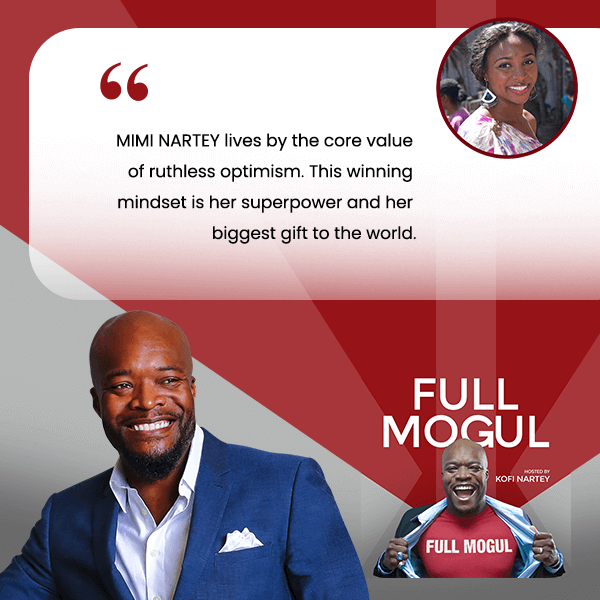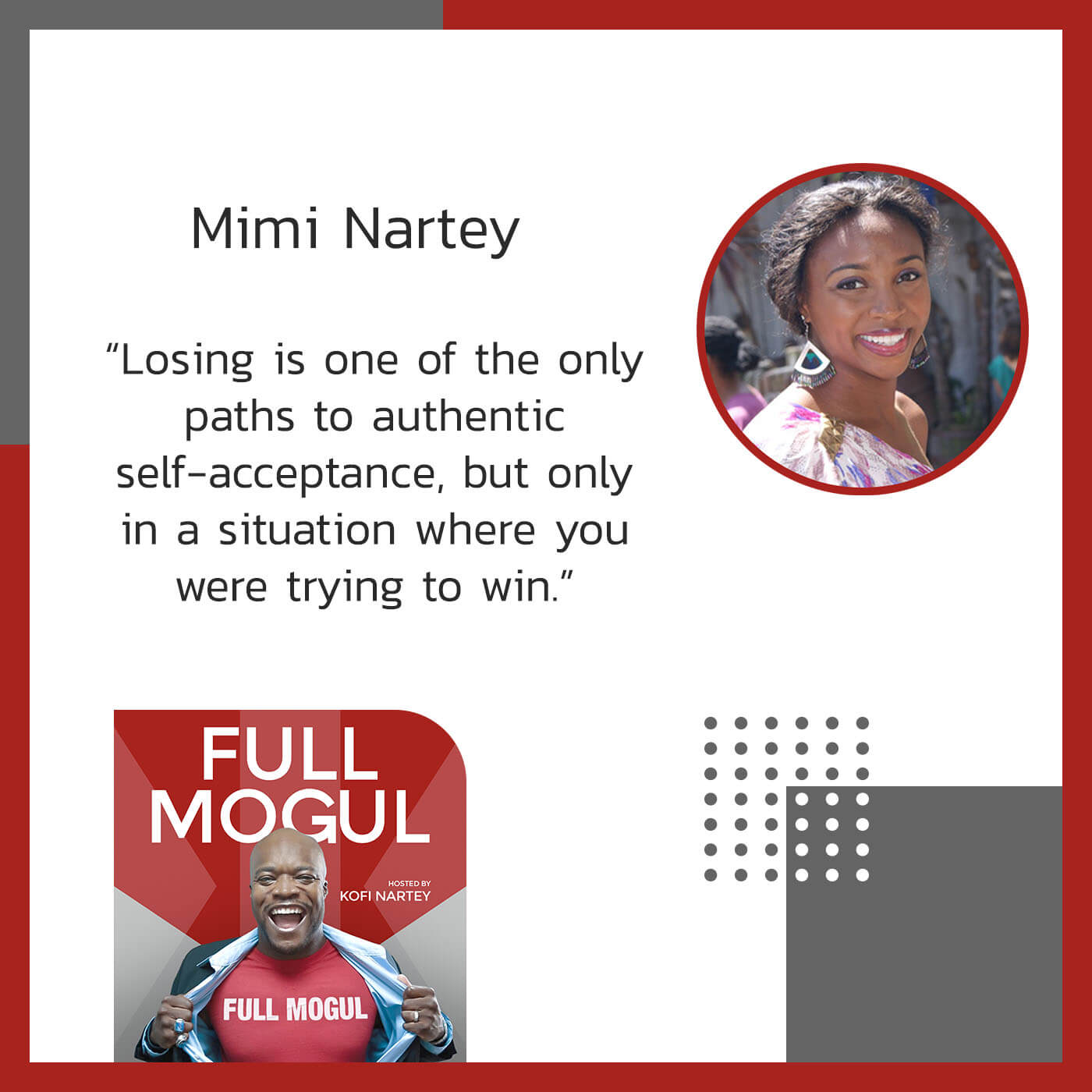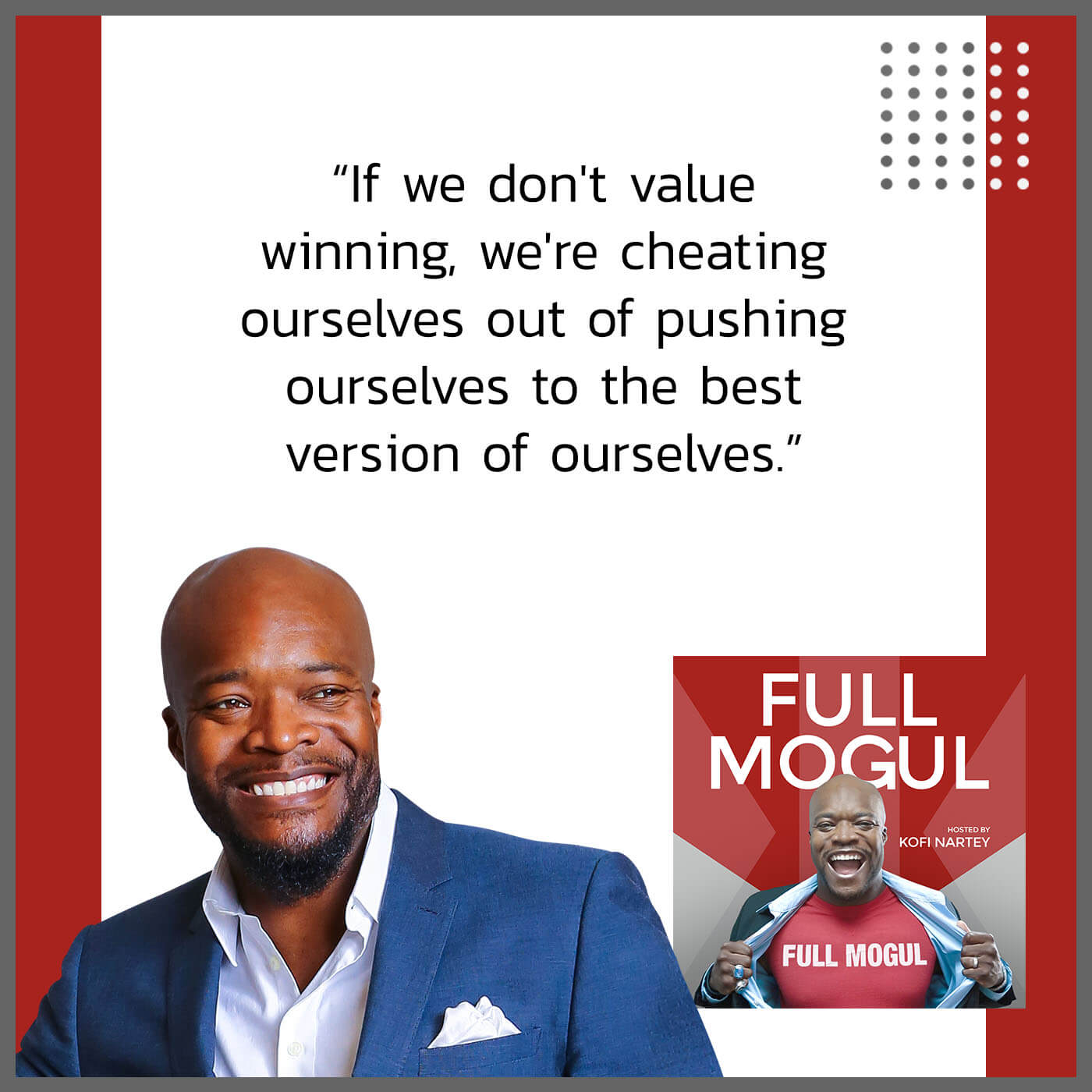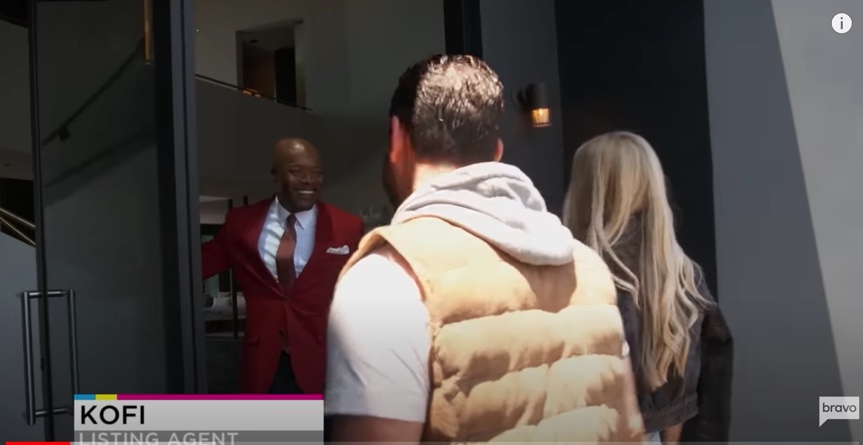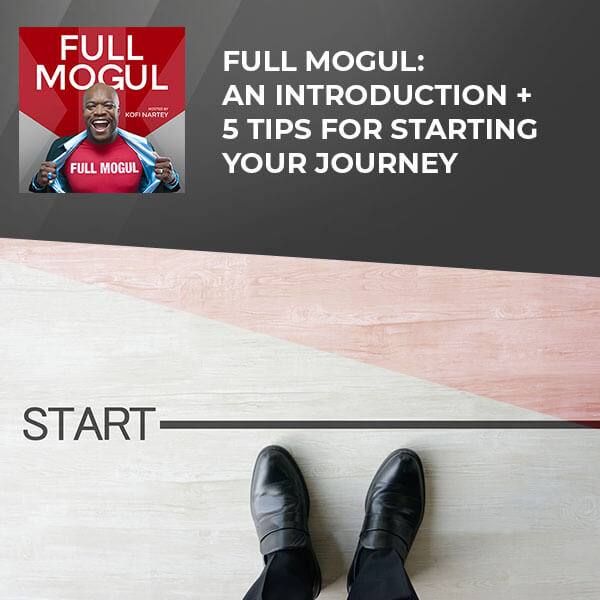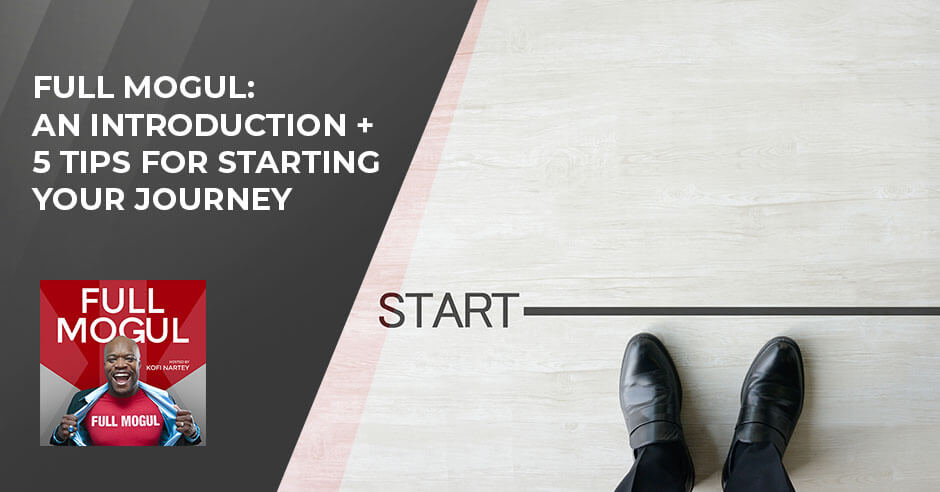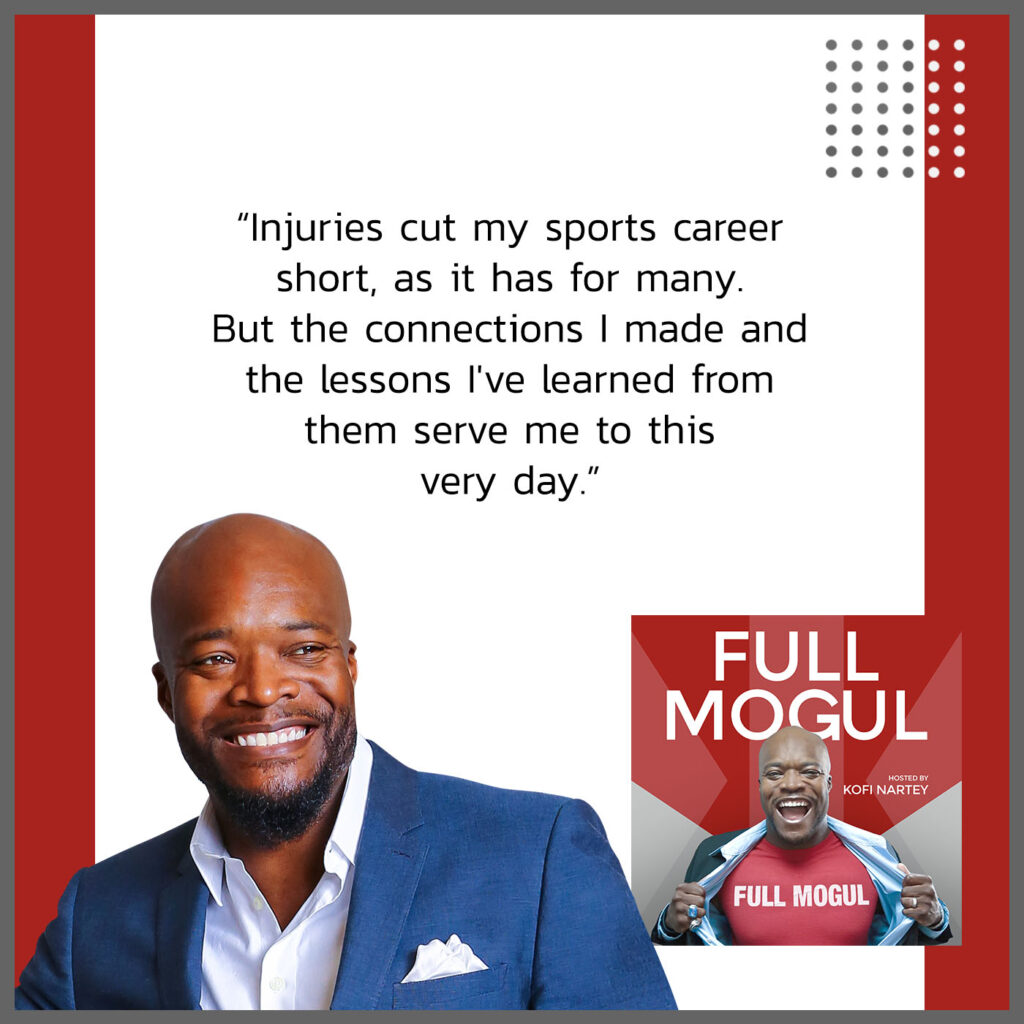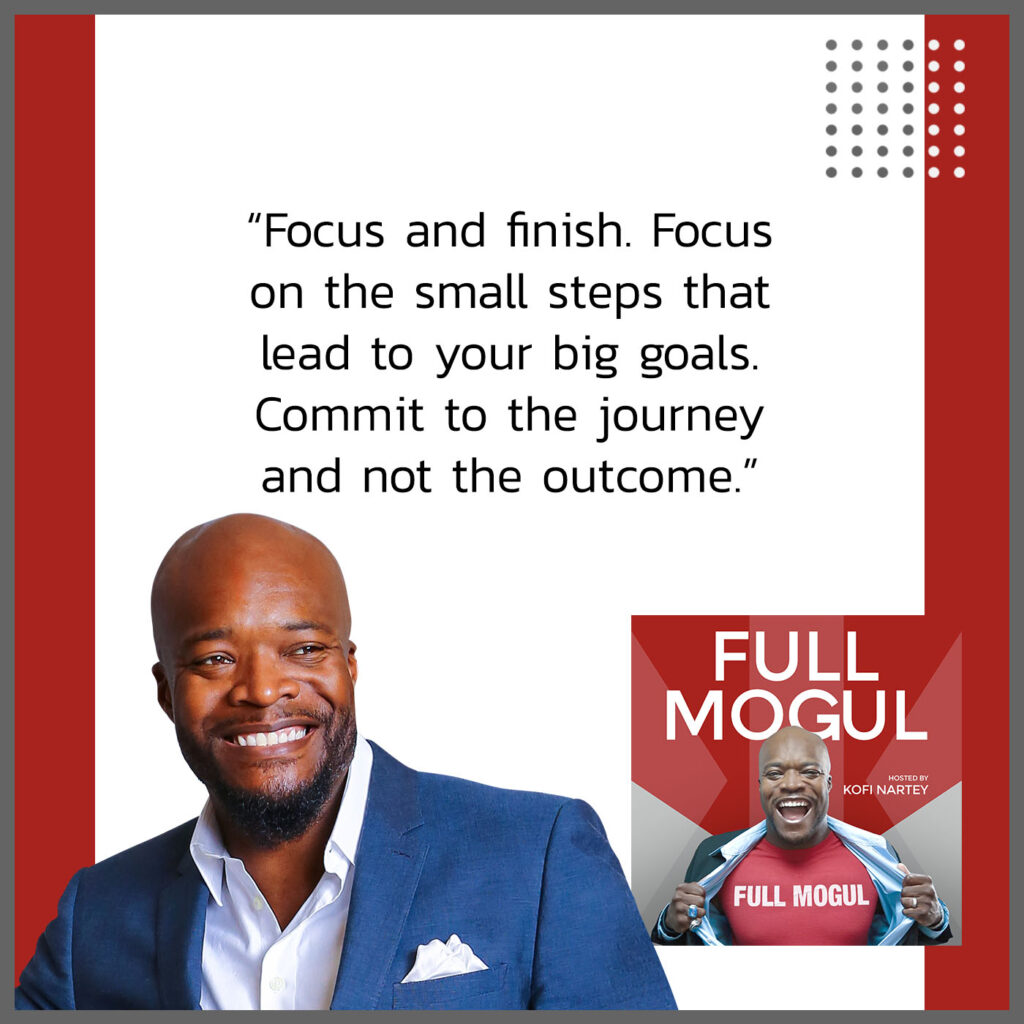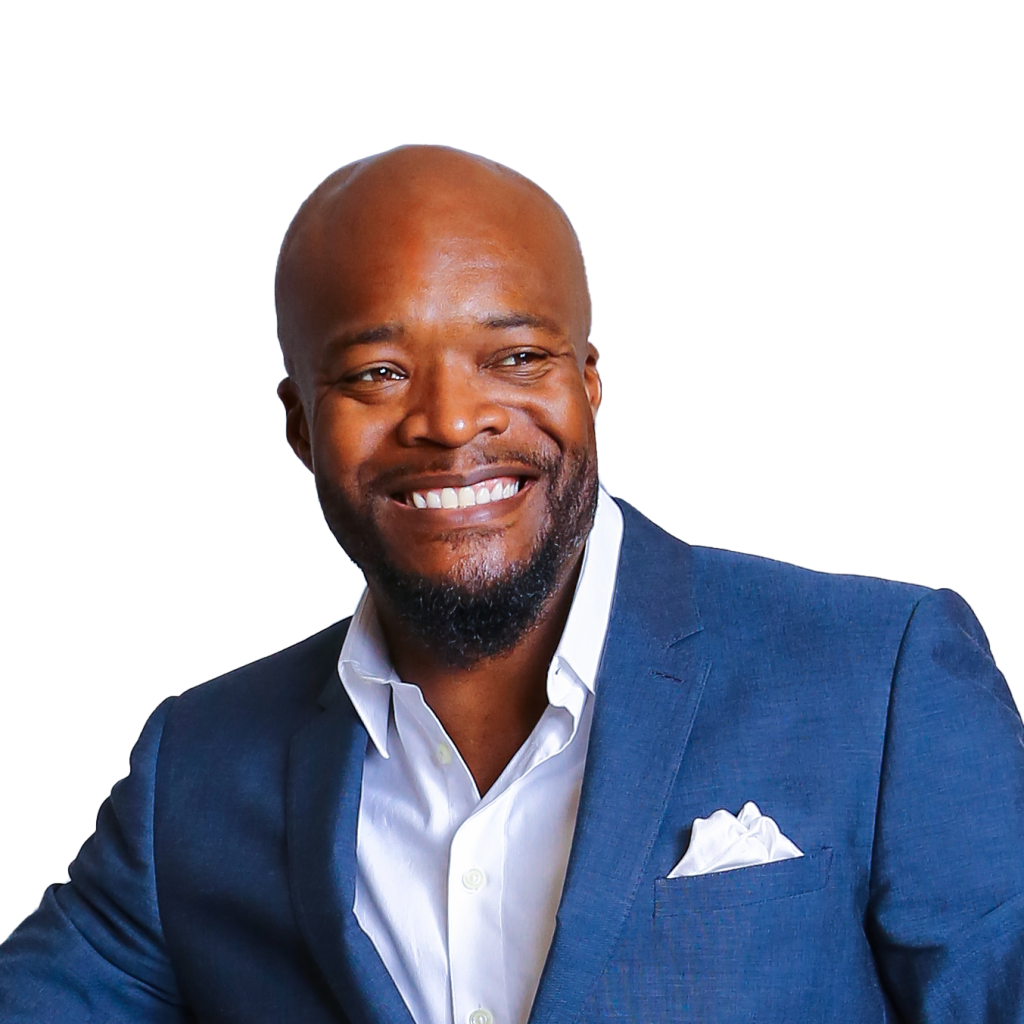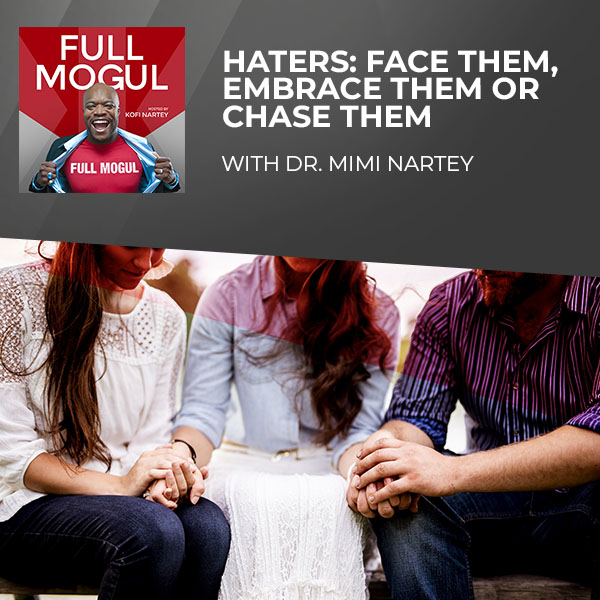
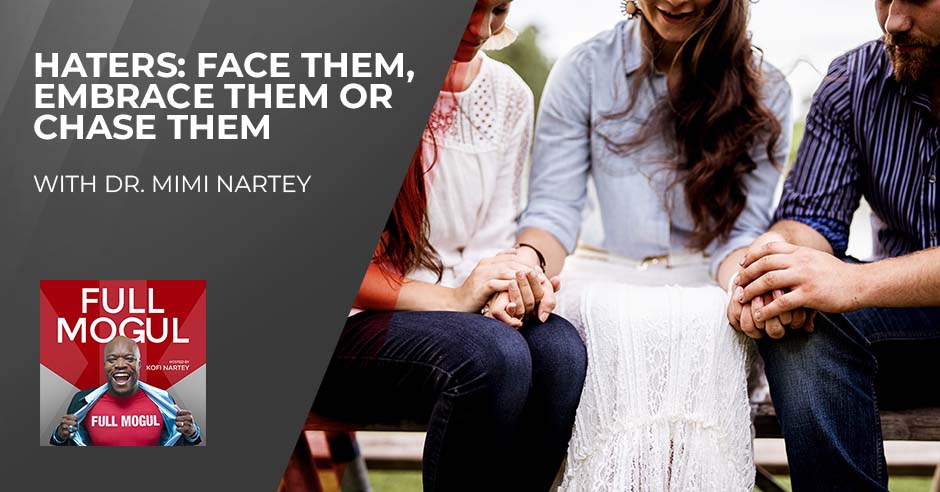
How do you deal with haters? These people hide behind social media profiles and workplaces, and they are everywhere! In this episode, Dr. Mimi Nartey, co-founder of The Nartey Sports Foundation, delves into how to deal with your haters and explains what toxic support is. What motivates them to make unkind statements? How do we protect ourselves from haters? You better not miss this interesting topic with Dr. Mimi and Kofi Nartey today!
---
Listen to the podcast here
HATERS: Face Them, Embrace Them Or Chase Them With Dr. Mimi Nartey
This episode is going to be a zinger. It's going to be a good one. I’m super excited about this. Some people aren't going to be excited about it because some people are guilty of being haters. We're diving into haters. The title of the talk is Haters: Face Them, Embrace Them, or Chase Them. We're going to jump right in, and I say we because I am joined by my number one supporter, not a hater at all, Dr. Mimi Nartey.
Thanks so much for having me. This is going to be a hot topic.
Let's jump right into the heat. What is a hater? How do we recognize haters? Who are these people? What does it mean to be hated?
I think this is great. There's an awareness now in popular culture about people who hate on other people. People love to throw that around. I hear our elementary school son talking about people hating or not hating. It's popular. We need to figure out what we mean. Who are these people in our lives that are hating on us? Why is it important? What does a hater look like? A hater is someone who could be online who's making unsolicited negative or limiting comments intended to attack you on a personal level.
There are more haters hiding behind social media profiles. We're definitely going to touch on that more than probably anywhere else.
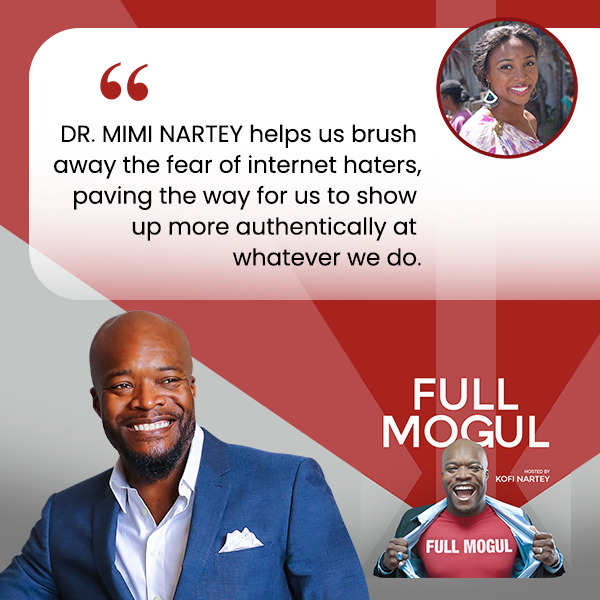
There are also haters in your professional environment. Those are people who are also making limiting comments about your potential or taking actions to hinder you or harm your professional reputation. There could be haters in our own families sometimes who are making subtle undercutting comments about you with statements like, “I don't know who he thinks he is,” or, “She thinks she's too good.” Haters could be someone that you're interacting with on a social level. It could be a friend, a person who's supposed to be a friend, who might be creating campaigns of doubt about you.
I’m not going to let us brush past the family piece. We're going to dig into more of this and the whole definition of what we see as haters, but sometimes it's those who are closest to you. You have to have an awareness and have your radar on to be able to even recognize those comments and those people who are touching you on a subconscious level that's negative.
I call that toxic support. You have people in your support system or people who are supposed to be part of your support group, your mastermind group, but somehow the level of support that they're giving is insufficient because there's a little bit of toxicity there.
That's an amazing oxymoron. I love that, toxic support. Sometimes we think it's support. It feels like support. We expect it to be support because it's somebody that is close to us. There's an expectation of care and love, but it's toxic. It's laced with toxicity.
Another important one is sometimes that hater is that voice of doubt inside your own head. That's the foundation for Imposter syndrome. What are we telling ourselves? What is our own self-talk? Get rid of the negative self-talk because that's a form of hate that we can control.
We talked about family and people close to you being big. Your own head and your own thoughts are the biggest. They are number one in terms of hitting on your process and creating that doubt, creating that negative energy. That's extremely important. It's extremely important to fill your mind with other things that can counteract that and combat those even doubts that show up as hate within yourself.
When you look at all of these examples, these are some of the ones that I came up with off the top of my head. Most of us in life or in business are experiencing this dynamic. That's why this matters, this important conversation to talk about. What do we do?
What do we do when there's obvious hate, when there's subtle hate, when there are backhanded comments? Even defining it and recognizing it is the first part of the battle. I pulled up the dictionary definition. There's the street version. There's the hip-hop version and the colloquial version. The Cambridge dictionary definition was pretty spot on, even for the purposes of our episode. “It's a person who says or writes unpleasant things about someone or criticizes their achievements, usually on the internet.” You talked about that and touched on it already that it's usually people hiding behind something who are throwing out these comments and these negative mentions.
What's funny is haters are people who are trying to usurp some power from another person. There are spiritually healthy sources of energy and power and spiritually unhealthy sources of energy and power. Hating is a spiritually unhealthy way to try to get energy or power by taking it from someone else with some disempowering comments or actions. It's not sustainable and it doesn't last. I do think that it's easiest for people to try to pluck power or chip away at people online.
Hating is a spiritually unhealthy way to get energy or power by taking it from someone else with disempowering comments or actions. It's not sustainable, and it doesn't last. Click To Tweet
You gave it the term toxic support. I even put in my notes. We never compare notes ahead of time because it makes it a little bit more dynamic when we show up and either are overlapping or contradicting each other. I had supportive haters because there are those people who are positioning themselves as part of your support group or a supporter of you, but they're only going to encourage you towards the limits or outcomes that they are comfortable with you reaching. They're going to push you to a point, not of your full potential, but of the potential that they're comfortable seeing you achieve.
At the end of the day, people are hating because of their own insecurity, their own ignorance, or their lack of exposure. They're basically feeling threatened and confused by your grateful confidence. A lot of times, your positivity is convicting. That conviction is disempowering to them.
They have to have some self-defense mechanism. It's the insecurity that you mentioned. Sometimes it's even jealousy. It helps them still feel good about their limitations, their limiting beliefs, or their lack of achievement in their own lives.
When people are exposed to someone with particular combinations of gifts and talents, discipline, gratitude, and confidence, it challenges their own subconscious programming. If they don't have the tools to deal with it, they hate on you.
Sometimes it's for attention. There are people who use hateful commentary, especially on social media. It is what we call clickbait. They're trying to get attention in their otherwise boring lives. I’m going to hate on the haters. I’m going to make comments like that. Your life is boring if all you have to do is hide behind a desk, hide behind a phone, hide behind a computer, and throw clickbait out at other people as hate.
Something else I want to throw out there is this. Unfortunately, as a woman, I can only speak about the experience of being a woman. We are socialized, and it almost seems like from a young age, to hate other women. We are fed lies that support a scarcity mentality. We're led to believe that there's only a limited amount of beauty, a limited amount of success, or a limited amount of happiness. If someone else has it, it poses a threat to me, when in reality, the truth is abundance, not limitation.
I want you to spend another minute or so on that one. For our women readers out there, this is something that we see. We see it on the internet, we see it on social media, and we've even seen the other side of it. Those are women supporting women and women adjusting your crown.
Real queens fix each other's crowns.
I didn't know what they were saying, but I knew there was something about a crown. Why is that so important?
Unfortunately, when we think about social oppression, what is it, really? Effective social oppression creates a situation where you disempower yourself. You are pushing down. You feel like crabs in a barrel, fighting for significance, importance, or validation on some level. Unfortunately, it's been tough with women. We're made to feel like, “If someone else is beautiful, that might mean that I’m not beautiful.” In reality, multiple people can be beautiful, have been, and will be for eternity.
I do think that what I have been encouraged by, as you're saying, is women's empowerment movements. That's the crux of it. It is about intersectional feminism, women respecting who we are in our myriad of beautiful expressions, and being encouraging and feeling like, “I can be who I am. I’m not threatened by someone else being who she is.” I’m empowered by other people's traits, talents, and gifts.
On the male side, we look at success the same way. We look at physical attributes the same way. We look at these things like, “From that scarcity standpoint, this person's successful,” or, “If they've achieved success in my industry, is there room for me to succeed? Is there a pathway?” Yes, there is. When you look at our Mogul Nation and our Full Mogul pursuits, the highest and best version of every individual creates the highest and best society. Imagine if everybody is living up to their full potential because their potential, your full potential, our Mogul Nation's individual full potential is unique to them. No one else will achieve your full potential.
There's a quote maybe from Gandhi. I’m definitely not going to get it exactly right. It's something to the effect that all of the problems in the world or the majority of the problems in the world could be solved by closing the gap between what it is that we're doing and what we have the potential to be doing collectively.
Coming back to the idea of clickbait, it is this whole thing that controversial sells. When somebody makes controversial statements, it gets them headlines. I feel like some people don't even believe at their core what they're saying or the hate they're putting out there. Some people have made a brand out of making controversial statements and creating these fires on Instagram and Twitter, and getting the news to talk about them. That's their only pathway to fame. They aren't even living their truth. They're throwing these things out to hate on other people or to make controversial statements to get attention.
That makes me think through all of the different kinds of haters there are out there. There are all of these different things motivating them to make these unkind statements on a daily basis for attention because they haven't quite tapped into or tuned into what their real gifts are and where should they be putting their energy for sustainable significance.
One other classification of haters would be institutional haters because not all haters are human. There is some systemic and institutional level hate going on, some things that can limit your progression and opportunities. Sometimes we create those in our heads, but sometimes they're real.
The haters can be explicit and deliberate like we're talking about. There are people who are out there saying whatever and doing whatever. That's usually likely in these cyberspaces where they don't have to be confronted or addressed back for the things or held accountable for the things they're saying. The subconscious haters, a lot of times, are the friends and family sometimes in that toxic support cycle where they may not even fully be aware that they are hating on you or why they're even doing what they're doing. These institutional haters, our cultural systems, and our political systems are unfortunately working on it but not optimally designed for everybody to be successful. A big institutional hater is the media.
The media is huge, which is why I know you like to avoid a lot of the rhetoric and the nonsense that's thrown out in the media, even to protect your vibration and your energy towards your own pursuits.
Getting back to the idea that a hater is a person who's chipping away at your energy and who's chipping away at your drive and your power, I limit my exposure to the media, especially visual media. If I want to update myself on the news or world events, I prefer to read my news because televised media or video media, is usually designed to provoke and destabilize you emotionally. I see that as a form of hate.
We've got to address our subtitle, Face Them, Embrace Them, or Chase Them. As I quickly lead into that, I wanted to touch on why we experience it as hate. Why do we feel like somebody is hating on ourselves? A lot of times, hate or those comments of hate or toxic support can serve as a reminder of a version of our former self that we’ve moved on from, or better yet, we’ve evolved from.
Those comments scare us because they remind us of that past. Even as you talked about the media and protecting yourself from the media, this is another reason we have to protect ourselves from certain people and certain types of hate because it can impact your own self-worth and your vision of your own self and even the pursuit of your goals.
What I’m hearing is that we have this vision of ourselves at our highest potential. That's somewhere in us. No matter what you've been through, no matter what childhood trauma you may or may not have experienced, somewhere in your heart is your understanding of your true potential and your true capacity.
We are all in an imperfect struggle or process to get to that. When we are experiencing hate, it perturbs our subconscious because we are trying to be pulled towards that highest version of ourselves, towards meaning, towards purpose, towards love, towards beauty, abundance, and expansion. What we have with this hating energy is someone trying to pull us back down, kill the vibration, keep us, at best, stagnant, if not pull us into a regression.
Let's jump right into when to face them and even to embrace them because sometimes we do have to take on our haters. Sometimes it even makes sense to embrace our haters. One example of that is when it provides you with the right spark and right motivation. This is a little bit of a tricky one. This can bring out the petty. You think about Michael Jordan, his pettiness, and his speech at the Hall of Fame, where he talked about all the people who said something negative or challenged him in a negative way. If you've seen The Last Dance, which I’ve seen nine times, I love it. It's a great documentary, all of that fueled him on a daily, weekly, monthly, and apparently his whole life. It fueled his drive for success.
This is important. If you're aiming for greatness in your career, greatness in sports, in your relationship, your family life, whatever it is, you're going to have haters. If you're aiming for greatness, especially in multiple areas of your life, you're certainly going to have haters. Everyone who's achieved something great, like your example of Michael Jordan, has experienced this particular form of adversity.
I do think that there are times when you can embrace your haters when the hater doesn't have close emotional proximity to you. Michael Jordan going back and looking at all of these people who may not have recognized his truest potential or his highest potential were people who still were at a certain particular emotional distance. That's why he could leverage that into fuel for himself.
Another time we should think through what we might be describing as hate, and maybe we want to embrace it, is when our haters are critics. What I mean by critic is there's an important difference there. A critic is a person that can make you better. It is a person who's a peer who may be offering actual insights and feedback that we may not want to hear, but it is important for us to embrace that.
I think about Dr. John Henrik Clarke, who's a famous African-American historian and professor. He basically created Pan-African studies. I remember him at a conference one day. He says something to the effect of, “I’m not here to debate with anyone. I’ve devoted twenty years of my life to this subject. I only debate with my equals. All others, I teach.” While that is a mic-dropping level-setting zinger in and of itself, what's important is he does acknowledge the opportunity when he would debate. That is when he encountered an equal.
For me, in my life, even through high school, college, and now as a full-on adult, I’ve embraced certain people that are intellectually my peers or know something more than I do, or I want to bounce something off of them. There are certain people in your life. I call them half-empty haters. They're not bad people at all. They're always cynical, or they're risk averse. They're cynical about everything.
Glass is always half empty to them until you prove to them that it's half full. I like those types of people for bouncing ideas off of them and realizing that they're not consciously trying to hate but rather gather information so they can believe in what you're saying. They challenge you in the right ways so you can justify and double down on what you're trying to do or maybe even gain some insider knowledge to make what you're doing better.
Those kinds of critics are the people with the experience and righteous authority to make objective evaluations on some idea that you have or some way that you're functioning. The difference between that critique or criticism and hate is the scope and quality of the commentary. Criticism is usually responsive rather than instigating. I might offer criticism to someone in response to something that they've said or written, carefully focusing on the logical fallacies, never intending to attack someone on a personal level.
You have to find people who will truly tell you like it is that you can trust. My good friend, Sharran Srivatsaa, I go to him quite a bit for conversations and to bounce ideas off of him. He's got a great podcast called Business School. Check it out if you haven't. He had this term that I refer to him as a sniper mentor. I can bounce a single statement off of him, and he's going to shoot straight and say, “Kofi, this is how you should do that. This is how you should attack it.”
It may come across as criticism or critique. He once told me about myself and about how I was falling short based on even gifts that I had and how I could do something better. I’m like, “I love you,” because he was willing to cut through it. You have to have those people in your lives. He's nowhere near a hater. He’s not an example of a hater, but these other people who come across as cynics, you can sometimes use them for that sniper mentorship where you go to them with a quick idea or a quick subject, and you're going to get that feedback. You're going to get those questions that make you better.
That feedback can move us all forward in thought. It makes us sharper in our methods and arguments. To some extent, some of the work that we have to do with ourselves is to understand whether someone is hating per se or is this someone who's trying to give me frank and honest feedback. Am I in a position to be able to receive that?
I also want to say it's a check for authenticity. That's a big one. It's a way to know that you are on the right path for you, by you, of you, and through to you. This is something I had to call myself out on years ago. It was like, “I get along with about everybody in my world. If I’m getting along with everybody, there's some part of my truth that I’m not truly embracing and not truly living.”
The true version of me can't rub everybody the right way. It's not true. You've been with me for many years. You've probably even seen part of that shift to call more things like I see them, to push people in ways that I think they could be better, to solicit unsolicited advice from people because I’m often giving unsolicited advice for that exact reason. I want it back. I want people to tell me how I can be better, but it's helped me live in my truth. Even a declaration I made a few years back was, “This is a year I’m going to transition to bringing out my haters.” It means I’m going to be living in my authenticity.
Everybody has a certain particular flavor. There's a certain particular flair. It can't suit all pallets. You do have to get to a place of comfort with yourself. That's a real sign of leadership, what you're describing, that process growth in leadership where you are willing to stand for what you believe in and recognize that it's not going to be what everybody believes in. That's what it is. I know that I’m not everybody's particular cup of tea, but then again, everybody doesn't necessarily have good taste. I’m just having a little fun. You have to be willing to have a little bit of controversy and conflict in order to walk in your real truth toward your purpose.
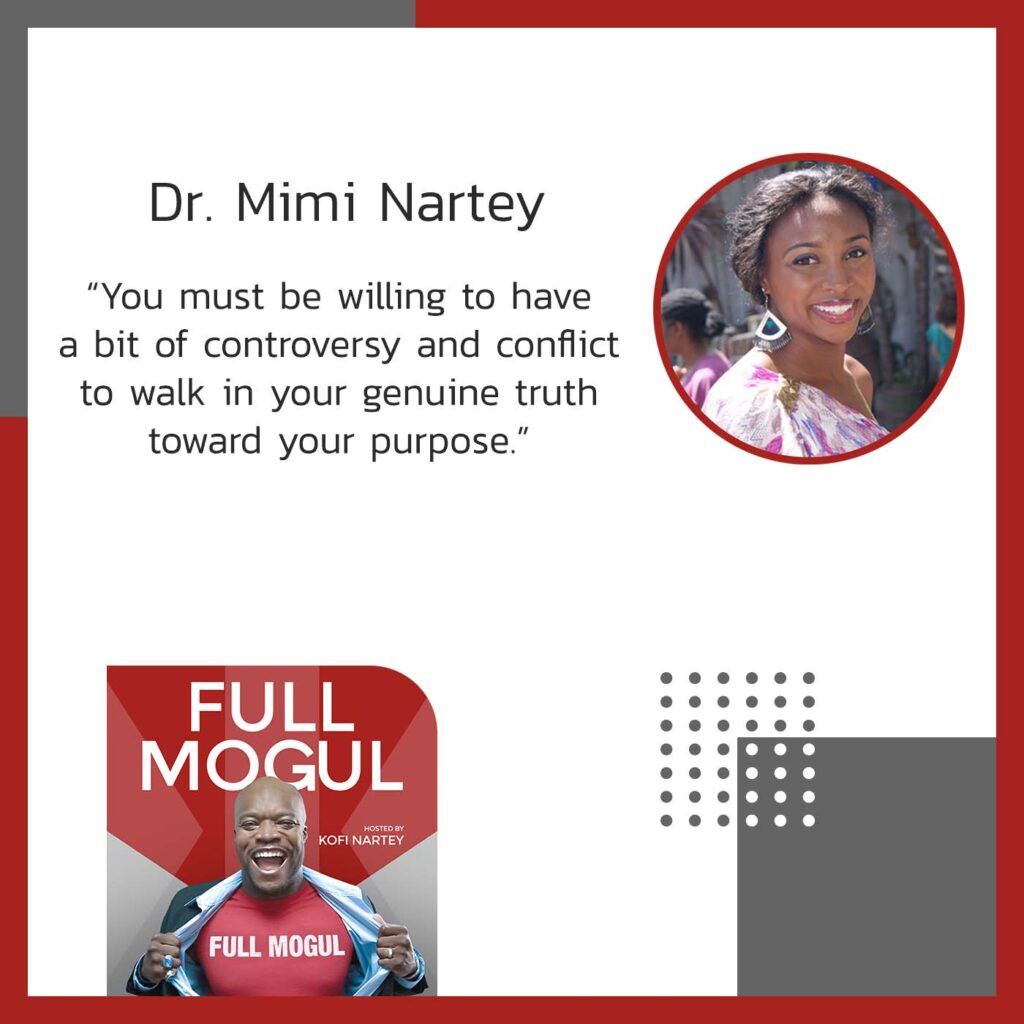
I love it because that authenticity that you bring to what you're doing creates more alignment with your inner being, your inner self. It creates more connection with what I call your tribe. The people who align with your line of thinking will embrace that. You'll even notice it in your social media feed, on your Facebook pages, and on your websites because when you make a statement that's bringing out the haters that are potentially controversial, they'll go to bat for you because they align with your thinking.
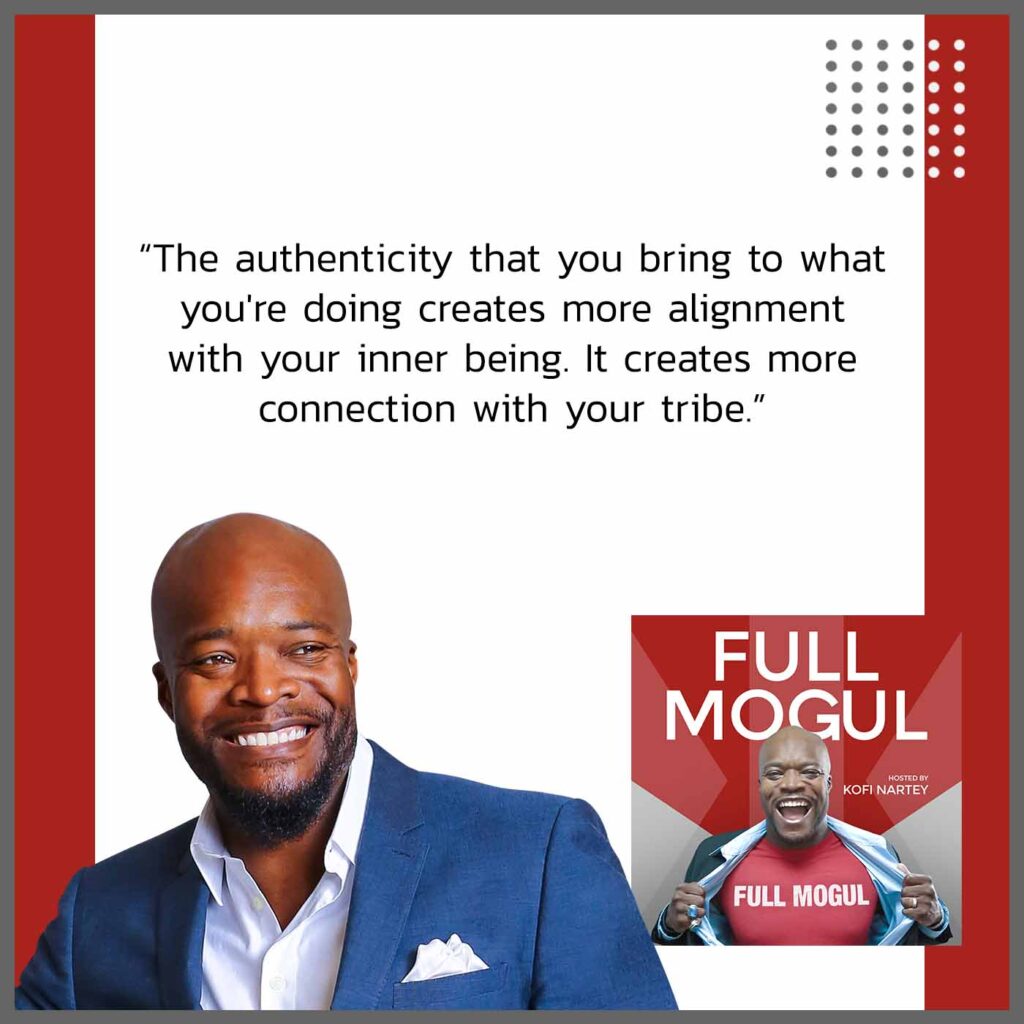
That's what I try to do, and that's how I try to function in my social media spaces. Beyond people that I’m friends with, I try to create a social media network that I think is in alignment with what I like. There's that reinforcing energy towards my goals, creating all of the different kinds of psychological cues to push me forward and help me be more authentic in the truth that I want to live.
Some of your haters, you can embrace for your own advantage. You can feed certain people who you know are haters or are rumor spreaders or who like to run and tell that. You can feed them certain information that's going to help your overall journey. It's going to help your overall messaging, and it's going to get you more clicks. You can use your haters who are trying to hate on you.
I love that, and maybe this is something that we can talk about in a future episode. There are a lot of ways to have other people and even leverage objects and opportunities to fight battles for you so that you don't have to spend too much energy or time fighting certain particular battles. You definitely can figure out how to leverage other people, opportunities, or objects.
We're going to do an episode on that. It was very controversial too. It was probably one of my most controversial social media posts. I had a social media post that I said, “Sometimes I let my clothes fight my battles. Louis Vuitton, Gucci, and Prada hit pretty hard.” People came out of the woodwork. Some people loved it, some people hated it. “You’re materialistic.”
Yes, you're right because it does do some of your speaking and communicating for you in whatever direction you're trying to take it. We're going to do an episode on that, for sure. I love this idea of leaning into it to find your tribe and embrace your authenticity because it means you're on the right path. It reminds me of that Drake song. I won't say the title of the song, but he's got the chorus that says, “More money, more problems. Bring on the problems.”
More money, more problems, bring on the problems because that's bringing on the money. That's part of the process. Let's talk a little bit about when to avoid them. We're coming up on time here, but I definitely want to make sure we cover when to fully avoid them or anything critical that we missed on the other two parts.
Right before we get into when to avoid them, I want to drop one little bit of knowledge on when to face your haters. We did talk about institutional haters, and I have to say I am an INFJ personality. People who do personality assessments will understand that. I am an advocate. People like MLK Jr. share my same personality type. I want to say we always need to confront haters that are on the institutional level. That's part of our purpose, part of our mission, and part of bettering ourselves as humankind. We need to be willing to face and confront haters on that level, whether cultural haters or institutional haters.
We always need to confront haters that are on the institutional level. That's part of our purpose, part of our mission, and part of bettering ourselves as humankind. Click To Tweet
I’m going to piggyback on that, shout you out for that, and make sure that you guys processed what she's saying because I’ve seen it. You are an advocate. You are willing to take on the institution, take on the haters, not just for yourself, but even more so willing to take it on, on behalf of others, and on behalf of institutional challenges and institutional level hate. Not even just the individual level, but how do you change institutional problems without embracing them, facing them, and challenging them the way that you do? Shout out to you for that.
I want to encourage everybody to find your advocacy. Sometimes it does look like something that's confrontational. You can't be conflict-avoidant at all times. Also, it could be in the form of starting something new, starting organizations for women in a particular organization, or for people of color. That's the advocacy. That's when we need to stand up and take on institutions and face that kind of hate.
As we wrap up, let's talk about a few times or instances or reasons to avoid your haters. One of the first things that comes to mind for me is what I call castle building. When you're castle building, when you're building your big idea, or when you're building your identity, you have to protect that concrete until it firms up. You have to protect that foundation.
If you're building a house, you can't build on top of the foundation while the concrete is still wet. If you let negativity penetrate that concrete, you're going to have that negativity and that doubt all throughout the rest of the building process. When you have a new idea, sometimes it's better to keep it to yourself. Can you keep a secret? I can't. Sometimes you have to keep that.
It's even part of my focus and finish mantra. Focus on this or finish that before announcing it before sharing it because I’m building a new castle and I need to protect the purity of it. I need to protect the emotional fragility of that idea until I get to a place where I can share it with the world with confidence, and the negativity will bounce off or make it better.
I love considering timing as far as when it’s time to avoid haters. I want to talk about time and space. These are always good organizing principles. It's most important to avoid haters that have close proximity to you physically and emotionally. The impact of haters is usually a function of their proximity. If someone is close to you emotionally, they can do so much more damage to you mentally and emotionally as they try to disempower you. Think about those people that you might share something deeply personal or painful, and then later, they attempt to use that very same thing to try to tear you down.
It's the people closest to you that know how to use it against you to tear you down later.
Once I realize that kind of person in my life, I have a pretty absolute policy about those haters in close proximity. I cut them out swiftly, decisively, and without regret. I think of it as part of my process of being a highly self-disciplined self. Self-discipline is doing the things that you need to do even if you don't want to do it. I could face some social rejection on some level by cutting certain people out of my life. I need to be disciplined. If I’m serious about my goals, my process, and who I want to be and lining up with what I think God's vision is for my life, I need to be disciplined and remove those kinds of people out of my inner circles who I can't trust to be genuinely supportive of my process.
I want to clap. It's good, and it's also one of these moments. I always bring up how we don't compare notes until we get here, but you summarized three points for me. That is, 1) Considering the messenger. You have to consider the messenger. Sometimes certain messengers you have to avoid. 2) It ties into unhealthy emotional baggage or if it's purely a distraction. That unhealthy emotional baggage can also tie into who the messenger is if it is somebody who is closest to you. 3) That willingness to cut people out, that willingness to keep people at arm's length and even take it a step further and cut them out of your lives.
Some people don't belong on the same train, on the same bus, on the same mission that you are on. You can wave at them from the window. Peace. See you later. As a matter of fact, some people, you love them, but they can't be on the journey. They can't be on the bus. When you get there, “I’ll save a seat for you at the table.”
I found it fascinating because it's interesting some of these haters are in so much disbelief when you deny them access. At the end of the day, my passions and my pursuits are too important to me to let that dynamic thrive. You need energy to fulfill your purpose, and you can't afford to have those haters in close proximity to you, chipping away at that energy and at that passion that you have.
For my salespeople out there, too, sometimes we get nervous about living our truths and being authentic. “Kofi, I might lose clients, I might lose people.” The people that you're meant to work with, the people that you're meant to have in your inner circle, it is those people. The truer you are and the more authentic you are, the faster they'll show up. I’m not saying go make crazy political statements or go crazy. No, don't do that. Use some wisdom. You have to live in that authentic truth and don't deny yourself of that because that also will eat away at your core.
I want to throw something out about living in your authentic truth. As a little tip on that, it's important for us to focus on what we are in favor of and what we're more in support of rather than making big, bold statements about what we are against. Take a more positive and constructive approach to making statements about what you're for rather than even me saying, “I’m against this injustice or this bias. I’m actually for inclusion, love, and equity.” When you put things in a constructive way, it's also a lot easier to live in your truth in a way that's going to be sustainable and inclusive. You're still going to find people who hate you, but you're on your path toward your highest and best self.
Focus on what we are in favor of and what we're more in support of rather than making big, bold statements about what we are against. Click To Tweet
Let's wrap this up. We've covered quite a bit here. Hopefully, we've said something controversial enough that we'll bring some haters to the table who will debate with us in a healthy debate. If they're not equipped for a healthy debate, then we'll teach them, as the doctor said. My last little thing here is fortifying yourself. Know what your goals are. We talk about definite chief aims, if you're familiar with that statement.
Knowing what your goal is to the extent that when you're castle building, when you've reached a point that you can share it, when you can invite those constructive critics in, those half-empty haters, you know when to avoid the people who have access to your emotional sensitivities. You know when to embrace them and use them. You have to build up enough fortitude and enough momentum that they bounce off of you when they're supposed to bounce off of you. Sometimes you're pulling that Neo and The Matrix and you're avoiding them all together.
You did a beautiful summary. The only thing I would offer in addition is, if you are trying to be successful and you're trying to be great, this is a part of the process. We're trying to offer, as Kofi has summarized so beautifully, some different strategies, some different guidelines, and some methods for you to begin to figure out how to address this because it is a part of the journey. Know that as those haters come out, look at it as an indication of, “I’m on my way.”
I’ve risen to a certain level of success or visibility that now the haters can finally see me. Let them come. Let them support your ambitions and your journey as a way of knowing that you are on your way. Thank you, Dr. Mimi Nartey. Thank you, wife. Thanks to Mogul Nation. Please comment. Send us notes on social media. Go to the website FullMogul.com. Share this show with someone. Secretly share it with your haters. We will see you on the next episode as we continue this mogul journey. Thanks.
Important Links
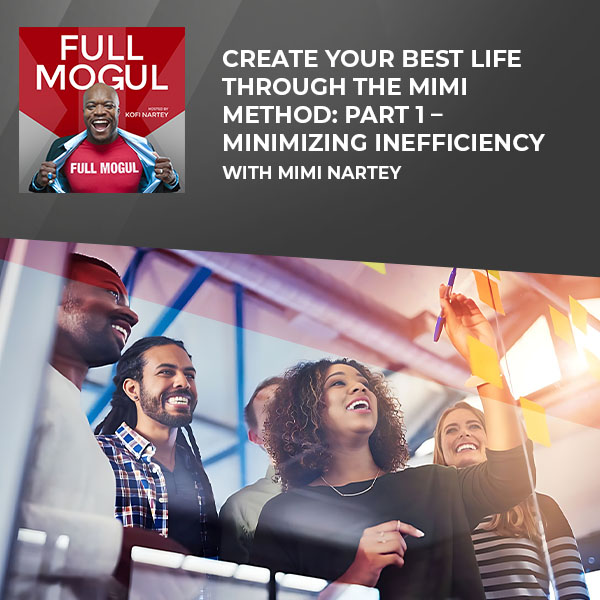
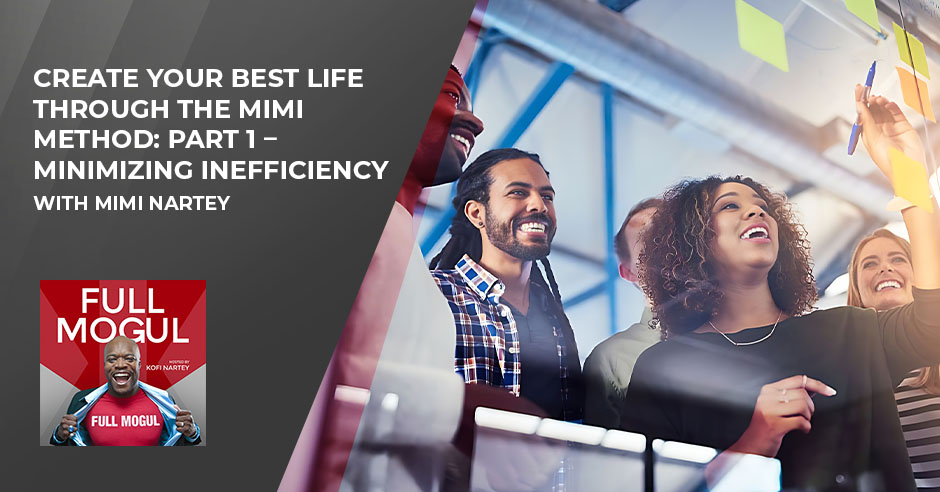
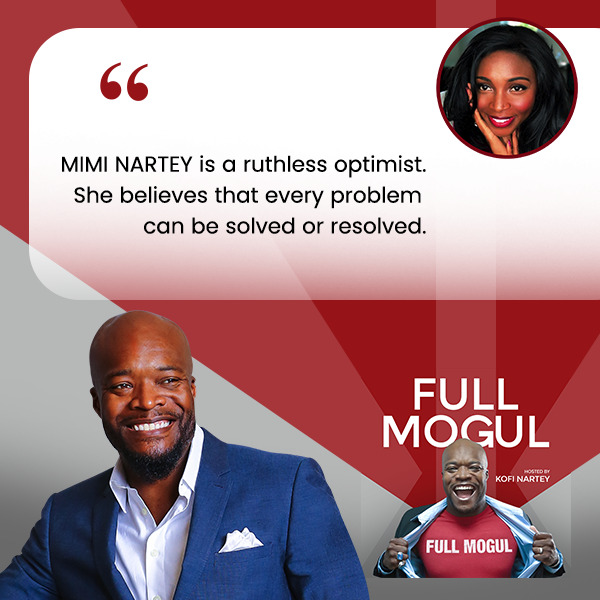
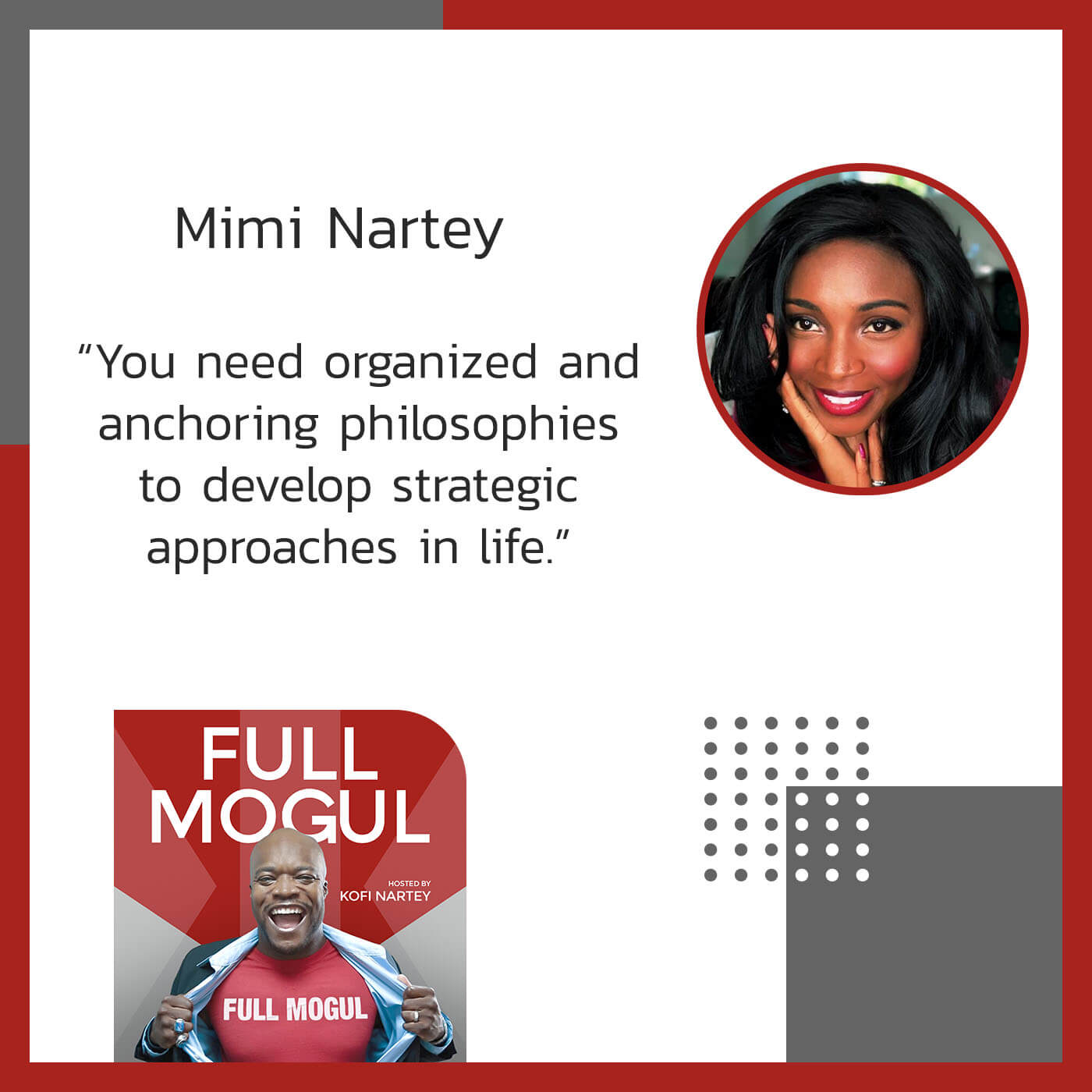
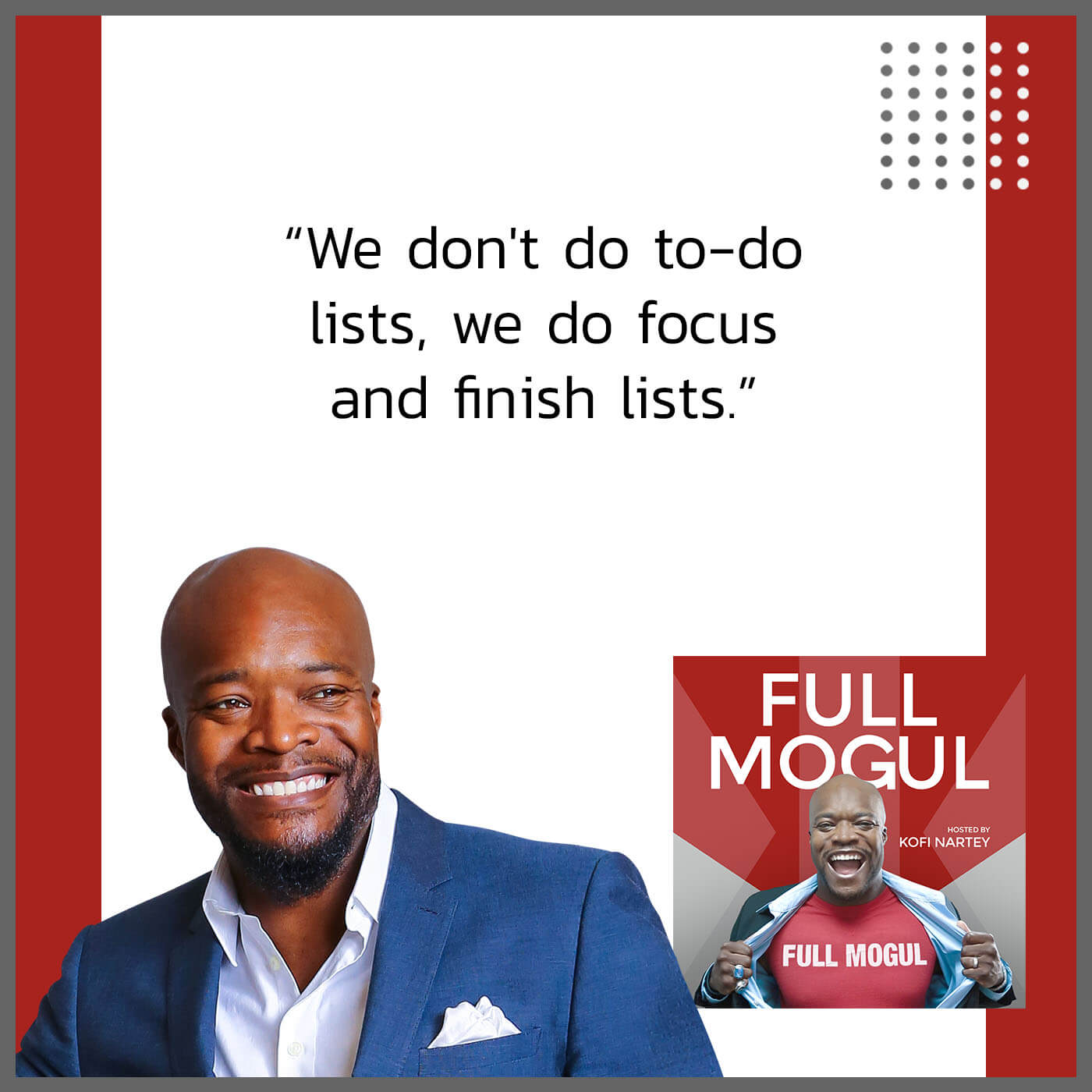

 Dr. Mimi Nartey is an interdisciplinary scholar and philanthropist who is passionate about integrating science, business, and philosophy to promote sustainability and empowerment. She has an undergraduate degree in environmental biology and a graduate degree in climate change from Columbia University. She completed her doctoral studies in public health. She has excelled in a myriad of pursuits, and her resume includes: FIFA World Cup soccer player, fashion model, research scientist, college professor, TEDx speaker, and Youth World Cup Coach. Her diverse experiences, ability to consider problems from an interdisciplinary perspective, personal motivations, diligence, and rigorous academic preparation have placed Mimi in a unique position to pioneer new approaches to social challenges in communities around the globe. She is now the Executive Director of the Nartey Sports Foundation, which is the charitable giving arm of GLOBL Real Estate and Development. Mimi has been married to Kofi Nartey for 16 years. They have two precocious children, Liya and Lincoln, who are also talented scholar athletes.
Dr. Mimi Nartey is an interdisciplinary scholar and philanthropist who is passionate about integrating science, business, and philosophy to promote sustainability and empowerment. She has an undergraduate degree in environmental biology and a graduate degree in climate change from Columbia University. She completed her doctoral studies in public health. She has excelled in a myriad of pursuits, and her resume includes: FIFA World Cup soccer player, fashion model, research scientist, college professor, TEDx speaker, and Youth World Cup Coach. Her diverse experiences, ability to consider problems from an interdisciplinary perspective, personal motivations, diligence, and rigorous academic preparation have placed Mimi in a unique position to pioneer new approaches to social challenges in communities around the globe. She is now the Executive Director of the Nartey Sports Foundation, which is the charitable giving arm of GLOBL Real Estate and Development. Mimi has been married to Kofi Nartey for 16 years. They have two precocious children, Liya and Lincoln, who are also talented scholar athletes.

